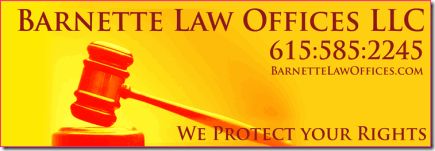According to a study conducted by the United States Public Interest Research Group, more than 79 percent of credit reports from the national credit bureaus (Experian®, TransUnion®, and Equifax®) contain either serious errors or mistakes. These errors have serious consequences on people, as credit reports are used for everything from granting credit and setting interest rates to obtaining insurance and employment.
The Fair Credit Reporting Act (15 U.S.C. § 1681 et seq.) is the federal legislation that regulates the credit reporting industry, including the national credit bureaus Equifax®, Experian®, and TransUnion®. The Fair Credit Reporting Act, or “FCRA,” was enacted to protect Tennessee consumers from the damage that errors in their credit reports cause. While the FCRA established a very flawed mechanism used to “dispute” inaccuracies appearing on consumers' credit reports, this mechanism doesn’t often work. Once an inaccuracy (i.e. an account that is not the person's, but is showing up on his or her credit report, or an account that is reported as derogatory but was never past due, etc.) is disputed to the credit bureau that is reporting the inaccuracy, the credit bureau has 30 days to perform a reasonable investigation of the disputed item. They usually don’t and thus, the item remains. The FCRA also requires that the credit bureau relay the consumer's dispute to the company that furnished the disputed information (called the “furnisher of information”) who then must also reasonably investigate the dispute. Again, this seldom occurs. Once the "investigation" is complete, the credit bureau must send an updated copy of the credit report to the consumer, showing the results of the investigation which usually convey that the item and/or items remain.
The credit bureaus often fail to perform the reasonable investigation required by the FCRA. When that happens, the consumer has a claim under 15 U.S.C. § 1681i. If the furnisher fails to perform a reasonable investigation, which also happens quite often, the consumer has a claim under 15 U.S.C. § 1681s-2(b). We at the Tennessee Fair Credit Reporting Act firm of Barnette Law Offices sue both the credit reporting agencies and furnishers of information for these claims. Our consultations are free and most cases are accepted on contingency plans.
The FCRA also requires credit bureaus to follow reasonable procedures to assure maximum possible accuracy of the credit reports they generate under 15 U.S.C. § 1681e(b). Despite this requirement, the credit bureaus often publish credit reports that contain obvious errors, such as when the credit bureaus combine the credit information of one consumer with that of another consumer who has a similar name and/or social security number.
If the credit bureau and/or furnisher negligently violate the FCRA, the consumer can recover his or her actual damages, plus attorneys' fees and expenses under 15 U.S.C. § 1681o. If the violation is willful, i.e. if it was done either intentionally or with reckless disregard, consumers can also recover punitive damages under 15 U.S.C. § 1681n.
The typical lawsuits fall under three categories:
One is the identity theft victim, who has his or her identity stolen when the imposter opens credit cards, etc. using a fraudulent name and social security number. Of course, the identity thief doesn't pay the bill, resulting in the credit card being charged off and reported onto the identity theft victim's credit report as a bad credit item. The victim learns of the fraud account(s) when he or she is denied credit and requests a credit report to learn why. The victim then disputes the fraud account(s) but because the credit bureaus and furnishers almost never go beyond simply comparing the name and social security number of the victim to the name and social security number on the account (which in identity theft cases almost always match, hence the identity theft), the fraud accounts do not get removed, thus ruining the person's credit.
Another common case is the mixed file case where the credit bureau mixes the credit files of two people with similar names and/or social security numbers. If one of these people has bad credit, it lands on the other person's credit report, ruining his or her credit. The same dispute process is used and sometimes works, but often just for a short while because, when the report is regenerated in the future, the same loose matching logic is used and the two credit files become mixed again.
The last common case is when something is just misreported by the furnisher - i.e. a credit card company reports an account as late that, in fact, was never late. If the credit bureau and/or credit card company fails to correct the error after it is disputed to the credit reporting agency, the consumer has a claim under 15 U.S.C. § 1681i.
Barnette Law Offices is one of the few law firms in Tennessee that routinely represents consumers in Fair Credit Reporting Act litigation and one of the few such firms in the nation.
In addition to Tennessee, Barnette Law Offices has represented consumers in FCRA cases all over the nation, including cases in Texas, D.C. and Michigan.
The recent amendments to the FCRA require the credit bureaus to each give you one free credit report per year. A website called www.annualcreditreport.com was set up to facilitate requesting your free credit reports. However, DO NOT USE THIS WEBSITE as the credit bureaus insert arbitration clauses into your online requests for your credit report, which could potentially waive your right to a damages trial. To request your free credit report from each of the three national credit bureaus, use the written form (which does not contain an arbitration clause) which you can download from https://www.annualcreditreport.com/cra/requestformfinal.pdf and then mail to the address on the form.
If you need to dispute errors on your credit report, write letters (sent certified mail, return receipt requested, if possible) disputing the errors to the following addresses:
Experian Information Solutions
701 Experian Pkwy
Allen, TX 75013
Equifax Information Services
P.O. Box 740241
Atlanta, GA 30374
Trans Union
P.O. Box 2000
Chester, PA 19022
In your dispute letter to the credit bureau, be sure to include your full name, Social Security number, date of birth, address and phone number in your dispute letter and itemize each error/account that you are disputing.
To schedule a case consultation with our attorneys, contact Barnette Law Offices today at 615-585-2245 or info@barnettelawoffices.com















